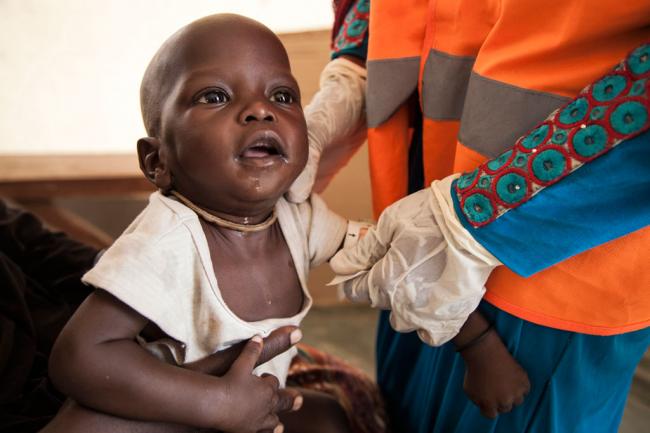
Northeast Nigeria: 400,000 children could suffer from malnutrition – UN
“If they do not receive the treatment they need, 1 in 5 of these children will die. Cases of diarrhoea, malaria and pneumonia are on the rise, further endangering children’s lives,” said UNICEF Executive Director Anthony Lake in a statement today.
“These figures represent only a fraction of the suffering. Large areas of Borno state are completely inaccessible to any kind of humanitarian assistance. We are extremely concerned about the children trapped in these areas,” he added.
According to UNICEF, in the worst affected states of Borno, Yobe and Adamawa, farming has been disrupted and crops destroyed, food reserves depleted and often pillaged, and livestock killed or abandoned.
Lake added that UNICEF programmes on vaccinations, safe water and sanitation, and treatment for acutely malnourished children are making a difference in the areas it is able to reach but these are “nowhere close to enough.”
“Without adequate resources and without safe access, we and our partners will be unable to reach children whose lives are at imminent risk,” he warned.
Meanwhile, the UN health agency reported that of the 743 health facilities in Borno state, 35 per cent are completely destroyed, 29 per cent partially damaged and only 34 per cent intact.
Of the 481 health facilities not destroyed, 31 per cent of them are not functioning, mostly as a result of lack of access due to insecurity. Almost 60 per cent of health facilities have no access to safe water (32 per cent have no access to any water at all) and 3 out of 4 facilities do not have enough chlorine stocks to decontaminate the water used in the facility.
“High insecurity, difficult terrain and lack of health workers, medicines, equipment and basic amenities such as safe water are making access to essential, lifesaving health care extremely difficult for people in this conflict-affected area,” said the UN World Health Organization (WHO) Representative in Nigeria, Dr. Wondi Alemu, in a news release.
In response to the crisis, WHO along with its partners has been supporting the Nigerian government to provide essential lifesaving health services, gather and analyse key health information, and prepare for and respond to disease outbreaks.
Additionally, about 100 temporary health facilities have been set up to support the response, of which 49 are emergency clinics for displaced people living in camps.
However, the UN health agency said that more resources are needed.
“The UN and partners need $94 million to provide health services to 6 million people, more than half of them children,” it noted in the release, adding: “Of this [we] need $31 million to deliver on [our] response plans in 2017.”
Photo: UNICEF/Katerina Vittozzi
Source: www.justearthnews.com
Support Our Journalism
We cannot do without you.. your contribution supports unbiased journalism
IBNS is not driven by any ism- not wokeism, not racism, not skewed secularism, not hyper right-wing or left liberal ideals, nor by any hardline religious beliefs or hyper nationalism. We want to serve you good old objective news, as they are. We do not judge or preach. We let people decide for themselves. We only try to present factual and well-sourced news.







